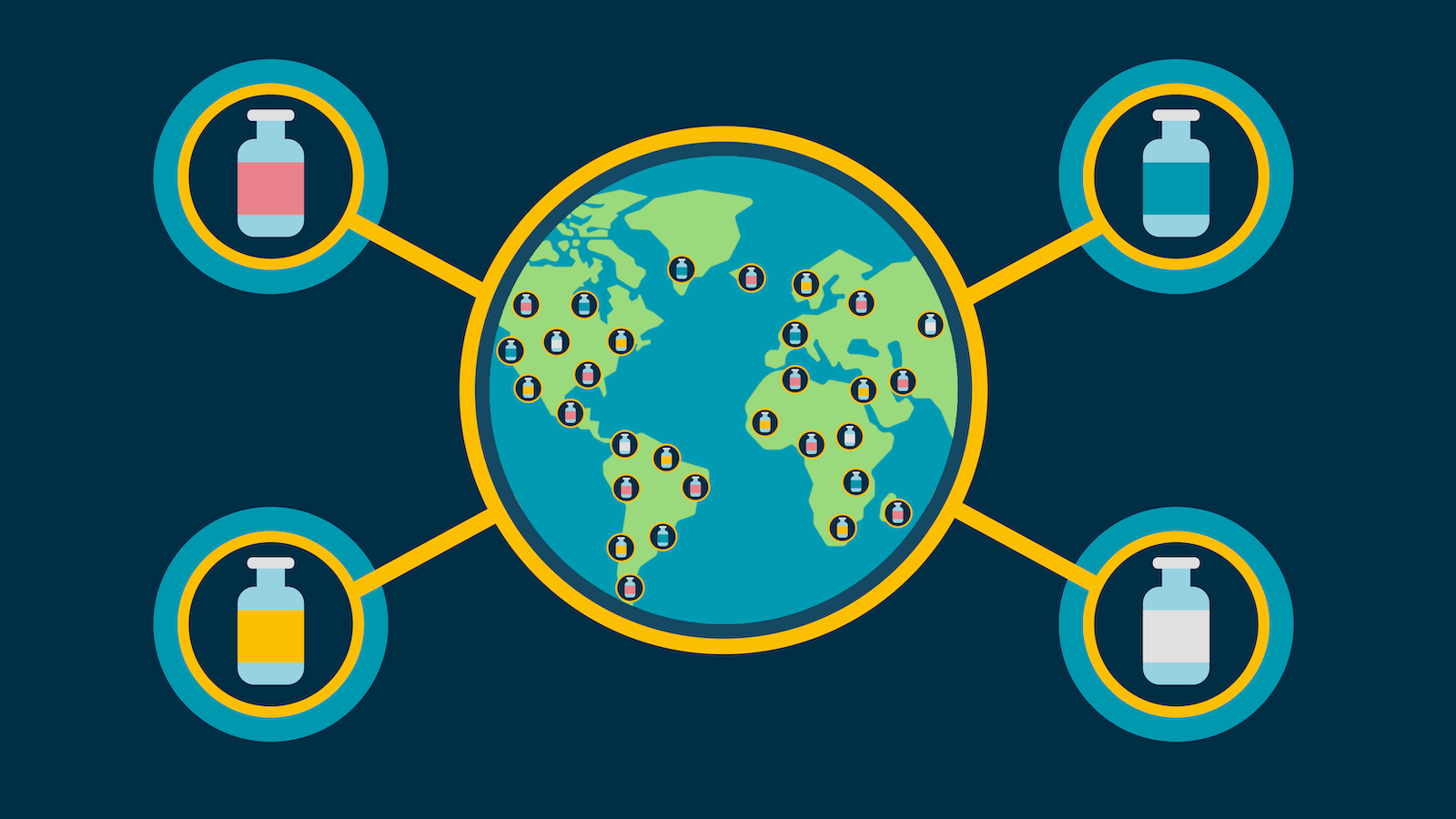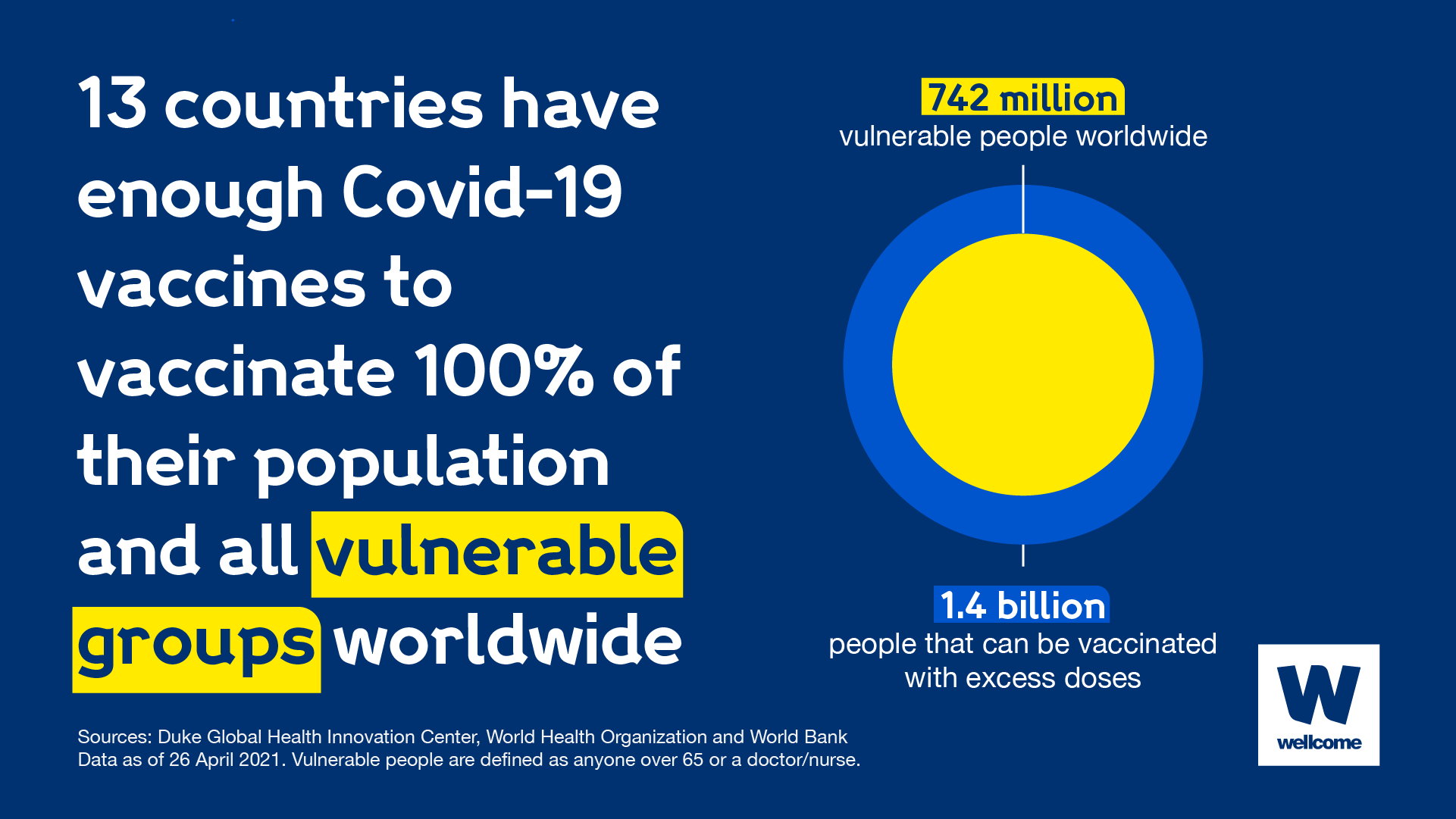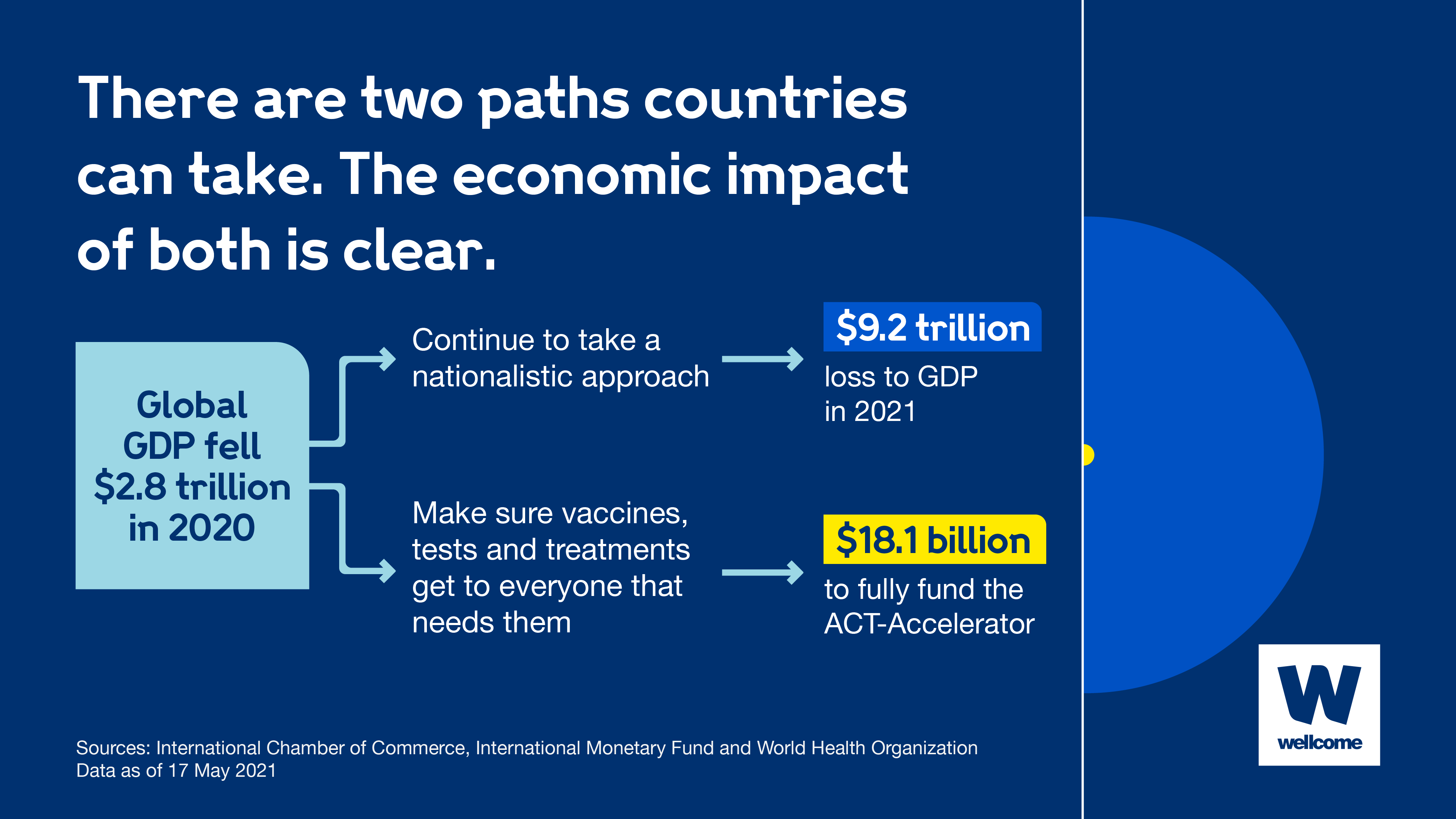Why is a global Covid-19 vaccine rollout vital?
The Covid-19 pandemic cannot end until everyone is safe, this means equitable and global access to the tools that can protect us including vaccines. Countries with more vaccines than they need must act now to ensure that doses reach those who need them most.


To date, nearly 2.12 billion Covid-19 vaccine doses have been administered in 176 countries, but the global roll out so far has highlighted huge inequalities.
Many countries have yet to start vaccinating their populations and some countries are not able to access vaccines at all.
What needs to happen for us to see a global Covid-19 vaccine rollout?
Anna Mouser, Policy and Advocacy Lead, Wellcome: Practically speaking, what do you think needs to happen to see that global rollout to become a reality?
Sir Jeremy Farrar OBE, Director of Wellcome: In 2020, the world did come together, coordinated through the World Health Organization. It brought together many of the world's governments, it brought together many of the world's philanthropy, and it brought together many of the world's industry and agencies.
It's there in order to make sure that the scientific advances of 2020 are now made available and benefit the whole world in an equitable way which brings the pandemic to an end and allows economies to get growing again. And it is that combination of the world coming together under the auspices of WHO in order to make fair and equitable access that brings the pandemic to a close, that will allow education go back, that will allow economies to regrow, and of course, it will protect people's lives.
COVAX, a multilateral initiative led by CEPI, GAVI and the World Health Organization, is working to ensure that vaccines are distributed fairly and that no countries are locked out of access to Covid-19 vaccines. The programme has made great progress so far and it is expected that as many as ~1.8 billion doses will be made available through COVAX in 2021.
However, most of the vaccine doses produced are still being bought up by countries making deals directly with pharmaceutical companies for their populations. So far, more than half of all confirmed Covid-19 vaccine orders have been from just a handful of high-income countries.
Covid-19 is exacerbating the already vast health inequalities across the world.
Countries and regions with the highest incomes are getting vaccinated about 25 times faster than those with the lowest. As of May 2021, 40% of all Covid-19 vaccines administered globally have gone to people in 27 wealthy nations.
Vaccinating the whole population of a country before allowing others access could put millions of people at unnecessary risk.
Covid-19 vaccines will have the biggest impact on reducing strain on our health services, and reducing restrictions on other parts of society, if we use them to protect the most vulnerable first.

13 countries (Canada, UK, New Zealand, Australia, Chile, EU, USA, Israel, Switzerland, South Korea, Japan and Peru) have enough Covid-19 vaccines to vaccinate 100% of their population and the world's vulnerable groups.

13 countries have secured enough Covid-19 vaccines to vaccinate their entire population and all the vulnerable people – people aged 65 and over, doctors and nurses – across the world.
With many higher income countries securing deals directly with pharmaceutical companies, many lower income countries will rely on COVAX to gain access to Covid-19 vaccines.
Although vaccine production is being scaled up, supplies could be limited for some time and far below levels of demand. If there is no collaborative effort to manage vaccine access and distribution in a fair way, there could be hoarding in some places and shortages in others, meaning vaccines won't reach the most vulnerable in many countries, potentially for years to come.
A global roll out needs to happen in a fair way so all countries can benefit, regardless of their ability to negotiate a deal.
At the current rate of global vaccination, if countries were to donate their excess doses, we could vaccinate the world’s vulnerable groups in just 39 days.
19 million Covid-19 vaccines are given every day.
At this rate, we could vaccinate all vulnerable people globally in just 39 days.
We need governments to back COVAX and other global initiatives, and to share vaccine doses with other countries that need them. Any delay in ensuring fair and equitable access will only prolong the pandemic.
New strains of the virus, like those that were first identified in the UK and South Africa, have a greater opportunity to emerge if there is a lot of virus in circulation with many hosts.
Variants have the potential to make current treatments and vaccines less effective. We have already seen that some of these variants may reduce the efficacy of Covid-19 vaccines. Suppressing the spread of the virus and existing variants is essential to reduce the number of new variants emerging, some of which may have potential to evade existing vaccines.
How Covid-19 variants happen
All viruses naturally mutate. Sometimes a virus gets lucky and mutates in a way that helps it survive and spread more easily. The virus that causes Covid-19 is no exception.
New variants have been spreading across the world. They seem to transmit more easily. This could mean more people getting infected and more pressure on already stretched health services.
But we don't know yet how well existing treatments and vaccines will work against known and future variants.
To give the virus future opportunities to mutate, we need to cut transmission, increase the pace of research into Covid-19 treatments and vaccines, and make them available fairly across the world.
Scientists need more funding for Covid-19 research.
If we reduce the amount of virus everywhere, we reduce the opportunity for it to mutate and potentially produce new variants of concern. Vaccination, alongside public health interventions such as social distancing and handwashing, is one of our best tools to reduce the level of virus in communities.
However, vaccinating a lot of people in just a small number of countries will continue to leave high levels of virus circulating in other countries, providing opportunities for new variants to emerge. In a worst-case scenario, future Covid-19 variants may be able to evade the vaccines that are available.
As well as protecting against severe disease, vaccines help to reduce virus levels globally for many diseases. To ensure that Covid-19 is unable to spread, we need to ensure vaccines are rolled out on a global scale.
Most major economies across the world have been severely affected by the pandemic, and equitable access to Covid-19 vaccines is vital for achieving economic recovery.
A study on the topic, commissioned by the International Chamber of Commerce Research Foundation, found that if access to vaccines is not coordinated at a global level, the economy could contract by up to $9.2 trillion this year – equivalent to 7% of global GDP.

Sources: International Chamber of Commerce, International Monetary Fund and World Health Organization.
Data is accurate as of 2 June 2021.

Since all countries depend on other countries for trade, individual economies are unlikely to see significant recovery until their trading partners have similar access to vaccines. According to the study, unless a coordinated global vaccine rollout takes place, advanced economies could lose as much as 4% of their GDP by the end of 2021 – despite having effective vaccination programmes.
Economic growth urgently needs restarting to prevent a major global economic crisis and further job losses. To help us go back to work, return to school, see our families or have holidays abroad – and for economic growth to resume – we need to make vaccines available everywhere.
A lot of work is already being done by international organisations working together to ensure vaccines are available, accessible, appropriate and affordable for everyone.
Although this is good news, more is needed. Above all, the pace of the global rollout needs to increase. With Covid-19, we don’t have time to roll the vaccine out gradually, country by country. The best thing we can do to get control of the pandemic is to vaccinate around the world as quickly as possible, to protect populations everywhere.
The faster we can make sure the most vulnerable people are safe, the faster we can lift restrictions and return to school and work everywhere, and achieve global economic growth.
This article was first published on 2 March 2021.
The Covid-19 pandemic is global, and to bring the pandemic to a close, a collaborative, global approach is needed. But why is it so important that all countries have access to vaccines as soon as possible?